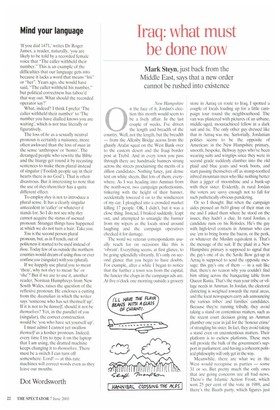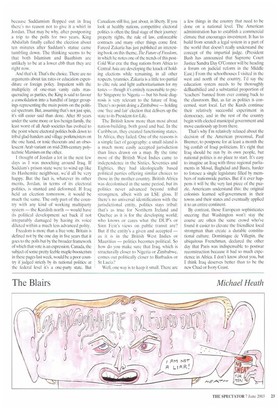Iraq: what must be done now
Mark Steyn, just back from the Middle East, says that a new order cannot be rushed into existence
New Hampshire
0 n the face of it, Jordan's election this month would seem to be a lively affair. In the last couple of weeks, I've driven the length and breadth of the country. Well, not the length, but the breadth — from the Allenby Bridge across from the ghastly Arafat squat on the West Bank over to the eastern desert and the Iraqi border post at Trebil. And in every town you pass through there are handmade banners strung across the streets proclaiming the merits of a zillion candidates. Nothing fancy, just dense text on white sheets. But lots of them, everywhere. As I was heading into Amman from the north-west, two campaign perfectionists, tinkering with the height of their banner, accidentally lowered it on to the windscreen of my car. I ploughed into a crowded market killing 17 people. OK. I didn't, but it was a close thing. Instead, [braked suddenly, leapt out, and attempted to untangle the banner from my wipers as the locals stood around laughing and the campaign operatives checked it for damage.
The word we veteran correspondents usually reach for on occasions like this is 'vibrant'. Everything seems, at first glance, to be going splendidly vibrantly. It's only on second glance that you begin to have doubts. For example, after a while I began to notice that the further a town was from the capital, the fancier the chaps in the campaign ads are. At five o'clock one morning outside a grocery store in Azraq en route to Iraq, I spotted a couple of locals loading up for a little earnpaign tour round the neighbourhood. The van was plastered with pictures of an urbane, middle-aged, moustachioed fellow in a dark suit and tie. The only other guy dressed like that in Azraq was me. Sartorially, Jordanian politics seems to be the opposite of American: in the New Hampshire primary, smooth, bespoke, Beltway types who've been wearing suits and wingtips since they were in second grade suddenly clamber into the old plaid and blue jeans and work boots, and start passing themselves off as stump-toothed inbred mountain men who like nothing better than a jigger of moonshine and a bunk-up with their sister. Evidently, in rural Jordan the voters are savvy enough not to fall for such pathetically obvious pandering.
Or so I thought. But when the campaign aides pressed an 8x10 glossy of their man on me and I asked them where he stood on the issues, they hadn't a clue. In rural Jordan, a candidate runs on his Rolodex. He's the guy with high-level contacts in Amman who can use 'em to bring home the bacon, or the pork, or whatever the Muslim equivalent is. That's the message of the suit. If the plaid in a New Hampshire primary is supposed to signal that the guy's one of us, the Savile Row get-up in Azraq is supposed to send the opposite message: this guy's one of them — in a suit like that, there's no reason why you couldn't find him sitting across the banqueting table from Queen Rania. That's the man your tribe or village needs in Amman. In Jordan, the electoral districting is weighted towards the rural areas, and the local newspapers carry ads announcing the various tribes' and families' candidates. Because they're running tribally, they avoid taking a stand on contentious matters, such as the recent court decision giving an Amman plumber one year in jail for the 'honour crime' of strangling his sister. In fact, they avoid taking a stand even on uncontentious matters. Their platform is to eschew platforms. These men will provide the bulk of the government's support in parliament, and having a coherent political philosophy will only get in the way.
Meanwhile, there are what we in the West would recognise as parties — some 31 or so. But pretty much the only ones that are going concerns are all bad news. There's the Islamic Action Front, which won 25 per cent of the vote in 1989, and there's the Baath party, which figures just because Saddamism flopped out in Iraq there's no reason not to give it a whirl in Jordan. That may be why, after postponing a trip to the polls for two years, King Abdullah finally called the election about ten minutes after Sadi:larn's statue came tumbling down. The thinking seems to he that both Islamism and Baathism are unlikely to be at a lower ebb than they are right now.
And that's it. That's the choice. There are no arguments about tax rates or education expenditure or foreign policy. Impatient with the multiplicity of one-man vanity cults masquerading as parties, the King is said to favour a consolidation into a handful of larger groupings representing the main points on the political spectrum. But, assuming that's not just spin, it's still easier said than done. After 80 years under the same more or less benign family, the least worst of all Arab societies has evolved to the point where electoral politics boils down to tribal glad-handers and village porkmeisters on the one hand, or toxic theocrats and an obsolescent Arab variant on mid-2Oth-century polytechnic Marxism on the other.
I thought of Jordan a lot in the next few days as I was mooching around Iraq. If Saddam's prison state were to wind up like its Hashemite neighbour, we'd all be very happy. But the fact is, whatever its other merits, Jordan, in terms of its electoral politics, is stunted and deformed, If Iraq held an election tomorrow, it would be much the same. The only part of the country with any kind of working multiparty system — the Kurdish north — would have its political development set back if not irreparably damaged by having its voice diluted within a much less advanced polity.
Freedom is more than a free vote, Britain is defined not by the one day in five years that it goes to the polls but by the broader framework of which that vote is an expression. Canada, the subject of some pretty feeble maple-boosterism in these pages last week, would be a poor country if judged strictly by its national politics: at the federal level it's a one-party state. But Canadians still live, just about, in liberty. If you look at healthy nations, competitive electoral politics is often the final stage of their journey: property rights, the rule of law, enforceable contracts and many other things come first. Famed Zakaria has just published an interesting book on this theme, The Future of Freedom, in which he notes one of the trends of this postCold War era: the thug nations from Africa to Central Asia are developing the knack of holding elections while remaining, in all other respects, tyrannies. Zakaria is a little too partial to elite rule and light authoritarianism for my tastes — though it's entirely reasonable to prefer Singapore to Nigeria — but his basic diagnosis is very relevant to the future of Iraq. There's no point doing a Zimbabwe — holding one 'free and fair' election that delivers up the state to its President-for-Life.
The British know more than most about nation-building, both good and bad. In the Caribbean, they created functioning states. In Africa, they failed. One of the reasons is a simple fact of geography: a small island is a much more easily accepted jurisdiction than lines drawn on a map. By the time most of the British West Indies came to independence in the Sixties, Seventies and Eighties, they had ideologically based political parties offering similar choices to those in the mother country. British Africa was decolonised in the same period, but its politics never advanced beyond tribal strongmen, albeit with an LSE gloss. If there's no universal identification with the jurisdictional entity, politics stays tribal: that's as true for Northern Ireland and Quebec as it is for the developing world; who knows or cares what the DUP's or Sinn Fein's views on public transit are? But if the entity's a given and accepted — as it is in the British West Indies or Mauritius — politics becomes political. So how do you make sure that Iraq, which is structurally closer to Nigeria or Zimbabwe, comes out politically closer to Barbados or St Lucia?
Well, one way is to keep it small. There are
a few things in the country that need to be done on a national level. The American administration has to establish a commercial climate that encourages investment. It has to build from scratch a legal system in a part of the world that doesn't really understand the concept of the impartial judge. (President Bush has announced that Supreme Court Justice Sandra Day O'Connor will be heading a forum on judicial reform in the Middle East.) From the schoolhouses I visited in the west and north of the country, I'd say the education system needs to be thoroughly deBaathified and a substantial proportion of 'teachers' banned from ever coming back to the classroom. But, as far as politics is concerned, start local. Let the Kurds continue their relatively successful experiment in democracy, and in the rest of the country begin with elected municipal government and move cautiously up from there.
That's why I'm relatively relaxed about the decision of the American proconsul, Paul Bremer, to postpone for at least a month the big confab of Iraqi politicians. It's right that Iraq should be run by its own people, but national politics is no place to start. It's easy to imagine an Iraq with three regional parliaments in Mosul, Baghdad and Basra, harder to foresee a single legislature filled by members of nationwide parties. But if it ever happens it will be the very last piece of the puzzle, Americans understand this: the original colonists learned self-government in their towns and their states and eventually applied it to an entire continent.
By contrast, those European sophisticates sneering that Washington won't stay the course are often the same crowd who've found it easier to elevate the friendliest local strongman than create a durable constitutional culture. Dominique de Villepin, the ubiquitous Frenchman, declared the other day that Paris was indispensable to postwar reconstruction because it had so much experience in Africa. I don't know about you, but I think Iraq deserves better than to be the new Chad or Ivory Coast.











































































 Previous page
Previous page